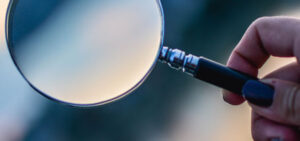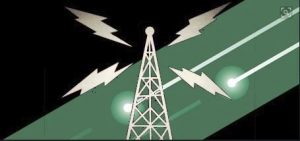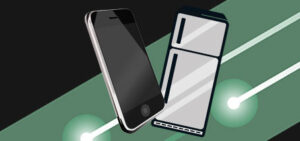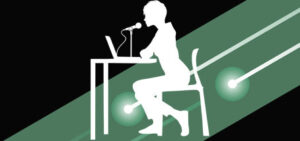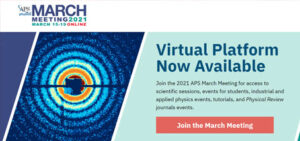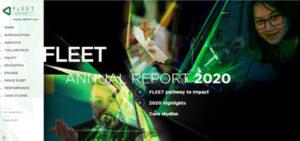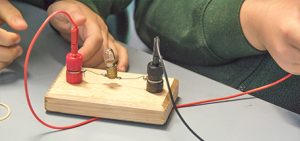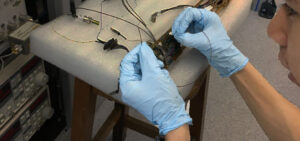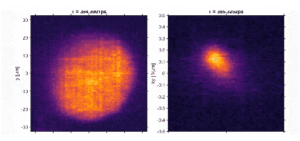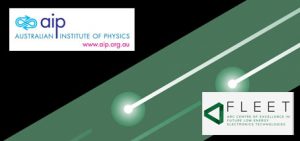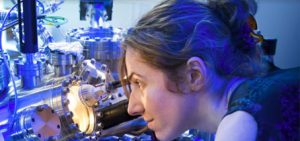Engage
See news from around FLEET, below
Catch up on all past issues of FLEET News newsletter
FLEET News
A new study, out this week, could pave the way to revolutionary, transparent electronics. Such see-through devices could potentially be integrated in glass, in flexible displays and in smart contact lenses, bringing to life futuristic devices that seem like the product of science fiction. For several decades, researchers have sought a new class of electronics based on semiconducting oxides, whose …
New study indicates holes the solution to operational speed/coherence trade-off, potential scaling up of qubits to a mini-quantum computer. Quantum computers are predicted to be much more powerful and functional than today’s ‘classical’ computers. One way to make a quantum bit is to use the ‘spin’ of an electron, which can point either up or down. To make quantum computers …
Three FLEET PhD students this month featured on popular radio science show Einstein a go-go, on the show’s regular “20 PhDs in 20 minutes” segment. In this format, student and host each get a minute, covering the student’s entire project in just two minutes combined. (Perfect practice for the famous ‘elevator pitch’.) The three FLEET presenters were Alex Nguyen (Monash), Matt …
Or, why we dropped a super-persuasive fact. It’s a much-quoted ‘fact’ that your smartphone uses more electricity than your fridge. And it’s very persuasive, particularly if you work (as we do) in the field of low-energy electronics. The entire field is predicated on the fact that computing/electronics use an unsustainable amount of electricity. And because most people don’t think of …
In 2019, after a remarkable achievement in reaching over 10,000 students, FLEET voluntarily raised its outreach target from 200 students to 2000 students, 50 teachers to 75 teachers and 2000 public members to 5000 public members. And then Covid happened … However, despite the unique challenges that Covid imposed on face-to-face outreach, cancelling public events and banning in-class or in-lab …
FLEET is dialling in to the online APS March Meeting from afar this year! Here’s a list of talks given by FLEET members and affiliates throughout the week to check out (if you have registered for the conference, catch-up links are provided on each page). Monday 15 March Ali Yazdani (Princeton University, FLEET Advisory Committee) Correlation and topology in magic …
We’re pleased to present hot-off-the-press FLEET ‘s 2020 Annual Report, detailing an extraordinary level of scientific output, as well as FLEET’s response to COVID-19. It was quite a year! The new online format is much easier to navigate and share with others (just share the relevant page’s URL), as well as being a bit gentler on the planet. Thanks everyone …
In 2020, FLEET continued the Year 10 ‘Future electronics’ course launched the year before in partnership with John Monash Science School (JMSS), Victoria. As well as covering the history of semiconductors, Moore’s Law and computing, the course introduces quantum physics at an intuitive level (with minimal maths) and expands on this fundamental understanding to explain complex, useful quantum states such …
Applying machine learning to automated characterisation of atomically-thin materials Just as James Cameron’s Terminator-800 was able to discriminate between “clothes, boots, and a motorcycle”, machine-learning could identify different areas of interest on 2D materials. The simple, automated optical identification of fundamentally different physical areas on these materials (eg, areas displaying doping, strain, and electronic disorder) could significantly accelerate the science …
Although 2020 posed unique challenges to in-person collaborations, FLEET proactively sought out opportunities to partner with other science organisations to further the reach of Centre-relevant science, advance equity issues and develop future leaders, for example: Working with the Australian Institute of Physics (AIP) to instigate and co-host a monthly series of talks spotlighting physics research at six different Australian Research …
Alex Hamilton’s QED group at UNSW recently hosted four summer students, working alongside FLEET’s researchers on nanofabrication and characterisation projects connected to the QED group’s key research mission. Over the course of their six-week placement, students pursued individual projects within the groups research project, developing individual skills in device fabrication and experimental process. The UNSW Physics Quantum Electronic Devices group …
The ‘sloshing’ of a quantum fluid comprised of light and matter reveals superfluid properties. An Australian-led team of physicists have successfully created sloshing quantum liquids in a ‘bucket’ formed by containment lasers. “These quantum fluids are expected to be as wavy as the oceans, but catching clear pictures of the waves is an experimental challenge,” says lead author Dr Eliezer …
FLEET pushed out the boundary of online talks, collaborating with the Australian Institute of Physics (AIP) to co-host a series of monthly public seminars highlighting Australian physics research. The new series throws the spotlight on a different Australian Research Council Centre of Excellence each month, with AIP members and others in the physics community joining over Zoom to hear about …
Could long-distance interactions between individual molecules forge a new way to compute? Interactions between individual molecules on a metal surface extend for surprisingly large distances – up to several nanometers. A new study, just published, of the changing shape of electronic states induced by these interactions, has potential future application in the use of molecules as individually addressable units. For …
FLEET scientists seeking new, creative ways to do science outreach found a silver lining in Covid-19 restrictions: they actually improved the experience for students. A team of FLEET-UNSW PhDs and early-career researchers (ECRs) was able to bridge 2020’s Covid restrictions to safely engage a classroom of students with virtual, but hands-on science. Led by PhD student Vivasha Govinden and node …

